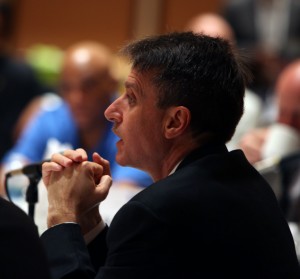 I’m looking forward to hosting TTD’s fall Executive Committee meeting next week. Strange concept: we’ll be welcoming a guest to our meeting, Rep. Frank LoBiondo (R-NJ), who votes with working people whether his party agrees with him or not. Yes, we’ll welcome a member of Congress who, if it existed, would be a member of the House Middle Class First Caucus.
I’m looking forward to hosting TTD’s fall Executive Committee meeting next week. Strange concept: we’ll be welcoming a guest to our meeting, Rep. Frank LoBiondo (R-NJ), who votes with working people whether his party agrees with him or not. Yes, we’ll welcome a member of Congress who, if it existed, would be a member of the House Middle Class First Caucus.
LoBiondo brings a gravitas to our conversation, as House aviation subcommittee chair, by being a member who is in the room when major transportation legislation is being written. But his expertise goes well beyond aviation—we’ll have a chance to talk shop with him on all the passenger and freight transportation issues confronting the nation and the challenges confronting transportation workers.
Rep. LoBiondo believes America can’t stand still and stop investing in our transportation system. That philosophy has kept millions of transportation and construction workers gainfully employed.
When some thought it was a good idea to change federal policy so that foreign interests can own and control U.S. airlines and threaten middle-class jobs, LoBiondo led the fight to stop that.
Every time a House member tries to defund or break up Amtrak the Congressman goes to work to stop those efforts.
When some in his own party tried to deny airline and rail worker fair rules to form and join unions, LoBiondo voted no.
He opposed recent attempts to scapegoat public transit, Amtrak and federal workers in the surface transportation bill.
When politicians in both parties tried to undermine the U.S. Merchant Marine and the good jobs it supports and sealift capacity it provides to our military, LoBiondo championed the opposition.
And he has always believed in (and voted for) protecting construction workers with federal prevailing wage protections.
With all the big transportation bills staring us in the face, this visit with LoBiondo gives us a chance to begin a strategic mobilization behind a “middle class first” transportation policy.